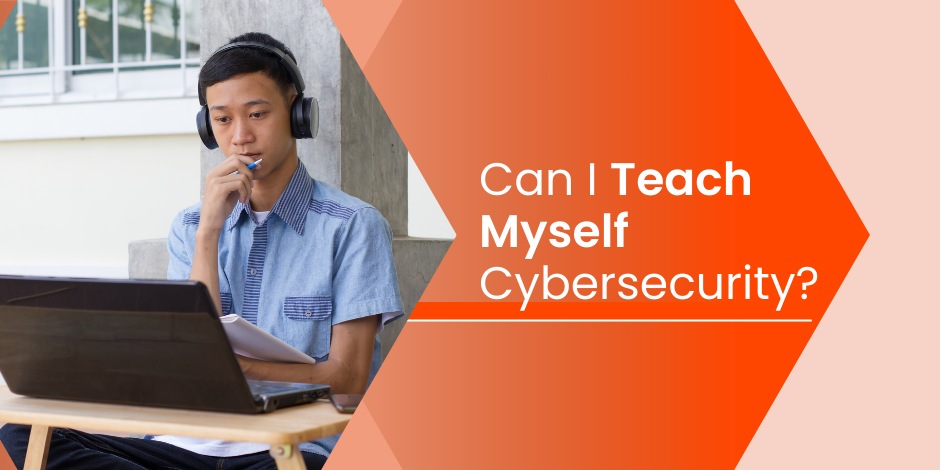Can I Teach Myself Cybersecurity?

Stay Informed With Our Weekly Newsletter
Receive crucial updates on the ever-evolving landscape of technology and innovation.
As cyber threats become increasingly sophisticated and prevalent, the need for individuals skilled in cybersecurity is more crucial than ever.
While many may assume that obtaining a degree or taking formal courses is necessary to enter this field, the truth is that self-teaching is a viable and valuable approach to learning or transitioning to cybersecurity.
So, if you’re asking: can I teach myself cybersecurity, this article is for you.
Can I teach myself cybersecurity? Understanding the basics

Before delving into the intricacies of cybersecurity, it is essential to have a clear understanding of what it entails.
Cybersecurity protects computer systems, networks, and data from unauthorized access, damage, or theft.
It involves implementing measures to prevent attacks and detect potential vulnerabilities.
To fully grasp cybersecurity, one must familiarise themselves with key terms and concepts.
This includes understanding different cyber threats, such as malware, phishing, and social engineering.
It also entails comprehending the various methods and technologies used to safeguard computer systems, such as firewalls, encryption, and intrusion detection systems.
Furthermore, a crucial aspect of cybersecurity is the importance of regular updates and patches.
Software vulnerabilities are often exploited by cyber criminals to gain access to systems, so ensuring that all software is current with the latest security patches is essential in reducing the risk of a breach.
Regular security assessments can also help identify any weaknesses in the system that need to be addressed.
Another critical consideration in cybersecurity is the human factor.
Despite technological advancements, humans remain one of the weakest links in the security chain.
Organizations must provide comprehensive training to employees on best practices for data security, including identifying and responding to potential threats.
This human-centric approach to cybersecurity can significantly enhance an organization’s security posture.
Can I teach myself cybersecurity? The importance of self-learning

Many budding cybersecurity experts ask: can I teach myself cybersecurity?
Self-teaching cybersecurity offers numerous benefits, making it an attractive option for aspiring professionals.
The demand for skilled cybersecurity professionals is rising as the digital landscape evolves.
Individuals must equip themselves with the necessary knowledge and skills to keep up with the ever-changing threats and challenges.
While formal courses and degrees in cybersecurity are available, self-teaching has emerged as a popular and effective alternative.
Benefits of self-teaching
- Flexibility: Self-teaching allows individuals to learn at their own pace and schedule. This flexibility is especially beneficial for those working full-time or with other commitments. Whether it’s early mornings, late nights, or weekends, self-teaching enables individuals to fit their learning around their existing responsibilities.
- Cost-effectiveness: Formal courses or degrees in cybersecurity can be expensive. Individuals can save significant money by self-teaching while still acquiring the necessary skills. With many online resources, tutorials, and communities, self-teaching has become an accessible and affordable option for many.
- Customization: Self-teaching allows individuals to tailor their learning experience to their needs and interests. They can focus on areas that align with their career goals and explore intriguing topics. This customization level enhances learning and fosters a deeper understanding and passion for the subject matter. However, self-teaching cybersecurity has its challenges. It requires dedication, discipline, and a proactive approach to learning. Let’s explore some common challenges and how to overcome them.
Challenges of self-learning and how to overcome them
- Lack of structure: Creating a structured learning plan with formal courses or guidance can be easier. However, this can be overcome by setting clear goals and objectives for oneself and breaking down the learning process into manageable steps. Creating a timeline and establishing milestones can provide a sense of direction and ensure progress is being made.
- Staying motivated: Self-teaching requires discipline and self-motivation. It can be easy to get discouraged or lose focus over time. To combat this, staying engaged and inspired by seeking out supportive communities or attending cybersecurity events is essential. Interacting with like-minded individuals, sharing experiences, and staying updated with industry news can reignite motivation and provide a sense of belonging.
- Keeping up with advancements: The field of cybersecurity is constantly evolving, with new threats and technologies emerging regularly. Self-teachers must consciously stay updated on current trends and developments through continuous learning and research. Subscribing to industry newsletters, following reputable blogs, and participating in online forums can help individuals stay abreast of the latest advancements and maintain their knowledge and skills. Self-teaching cybersecurity offers flexibility, cost-effectiveness, and customization.
However, it is essential to acknowledge and overcome the challenges of self-learning. With dedication, discipline, and a proactive mindset, individuals can successfully acquire the necessary skills and thrive in the dynamic field of cybersecurity.
Can I teach myself cybersecurity? Essential skills
To be proficient in cybersecurity, there are several essential skills that individuals should aim to acquire.
Technical skills for cybersecurity
- Networking: Understanding how computer networks function is crucial in identifying potential vulnerabilities and implementing effective security measures.
- Programming: Proficiency in programming languages such as Python, Java, or C++ is highly beneficial for vulnerability scanning tasks and secure code.
- Incident response: Effectively responding to and managing cybersecurity incidents is a critical skill in the field.
Soft skills for cybersecurity
- Analytical thinking: Analysing complex systems and identifying potential vulnerabilities or threats is essential in cybersecurity.
- Communication: Good communication skills are necessary for conveying technical information effectively and collaborating with other professionals.
- Problem-solving: A strong problem-solving mindset is crucial in cybersecurity, as professionals constantly face new and unexpected challenges.
Can I teach myself cybersecurity? Resources
Fortunately, numerous resources are available for individuals interested in self-teaching cybersecurity.
Online courses and tutorials
Online platforms such as Coursera, Udemy, and Pluralsight offer various cybersecurity courses and tutorials.
These resources provide structured learning materials, practical exercises, and assessments to help individuals build their knowledge and skills.
Books and e-books on cybersecurity
A significant amount of literature is available on the subject of cybersecurity.
Books and e-books written by experts in the field provide in-depth knowledge and insights, covering a wide range of topics from cryptography to ethical hacking.
Can I teach myself cybersecurity? Creating a plan

To ensure a successful self-learning journey, when asking if I can teach myself cybersecurity, it is important to create a well-defined plan.
Setting your learning goals
Start by setting clear and achievable learning goals.
Determine what specific areas of cybersecurity you wish to focus on and what skills you want to acquire.
Setting goals will help provide direction and motivation throughout the learning process.
Designing a study schedule
Establishing a study schedule is essential for effective self-learning.
Allocate dedicated time slots for studying and practicing cybersecurity concepts.
Break down your learning into smaller, manageable chunks to avoid feeling overwhelmed and make consistent progress towards your goals.
Bootcamps: a smart choice
A fast, cost-effective alternative to self-learning is a reputable, accredited program like the Institute of Data’s Cybersecurity program.
Our 3-month full-time or 6-month part-time program is taught by industry experts who offer real-world experience and insights.
Conclusion
Self-teaching cybersecurity is a viable and valuable method for individuals seeking to enter this field.
To answer the question: can I teach myself cybersecurity?
Anyone can teach themselves cybersecurity by understanding the basics, recognizing the importance of self-learning, acquiring essential skills, utilizing appropriate resources, and creating a structured learning plan.
With dedication, motivation, and continuous learning, one can develop the necessary knowledge and skills to become proficient in this crucial field.
Ready to launch your cybersecurity career?
The Institute of Data’s Cybersecurity program offers a balanced curriculum, industry-experienced instructors, and a focus on real-world applications.
Elevate your job prospects with a supportive environment and the professional connections you’ll need to set yourself up for success in this ever-expanding field of tech.
Want to learn more about our programs? Our local team is ready to give you a free career consultation. Contact us today!





